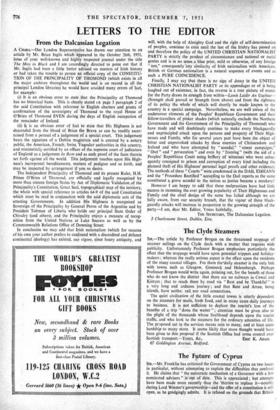The Future of Cyprus
SIR, ŌĆöMr. Franklin has criticised the Government of Cyprus on two issues in particular, without attempting to explain the difficulties that confront it. He claims that "the autocratic mechanism of a Governor with a few nominated advisers" is out of date. This is appreciated ; but attempts have been made more recently than the 'thirties to replace itŌĆönotably during Lord Winster's governorshipŌĆöand the offer of a constitution is still open, as he grudgingly admits. It is refused on the grounds that Britain has no right to confer it because the Cypriot's true allegiance is to Greece.
Secondly, on the question of local self-government Mr. Franklin only reveals the situation in part. Locgt authorities are reluctant to accept responsibility ; for important schemes such as those for water-supply or electricity, in spite of Government encouragement, little local support is forthcoming. The mayor or othedocal official is afraid that his chances In the next election will be jeopartlised if he supports a scheme which, however essential and ultimately beneficial, will bring taxation and give rise to doubt concerning his own loyalty to the Enosist cause.
After reflection it does not seem so strange that the Government has not thrust politica; rights on to the Cypriots. It is because they are Intelligent and able that the process must be slower. There is so much snore to build on than in the African colonies and so many more compli- cations. Cultural and political progress is interpreted by Africans in terms of British examplesi but by Cypriots in terms of Greek. The day will come when the Cypriots will behble constitutionally to vote for union with Greece, but it is to be hoped that the Government's record of economic and social benefits conferred will convince them that Enosis Is no longer necessary or advisable.ŌĆöI am, yours, &c.,



















































 Previous page
Previous page